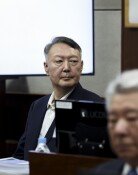Experts urge pres.-elect to nix unfeasible economic pledges
Experts urge pres.-elect to nix unfeasible economic pledges
Posted December. 22, 2012 00:25,
In this year`s presidential campaign, candidates made more pledges for wealth distribution and increased welfare than in any other election. This fueled fears of an increased fiscal burden caused by a drastic rise in welfare demand.
Economic experts say Koreas next president Park Geun-hye should tailor her economic policy frame to the extent that it does not hinder economic growth potential and fiscal health. Others also say the incoming administration should solidify its posture for an economic crisis given the great uncertainty surrounding the global economy in the wake of European and U.S. fiscal anxiety and slowing growth in emerging economies.
○ Filtering out unfeasible pledges
Many experts say President-elect Park should thoroughly review her campaign pledges and decisively abandon those deemed unfeasible or that could cause side effects in the economy. They stress that she should filter out pledges without clear funding sources, those that are contradictory or clash with each other, and those that could undermine the engine for economic growth.
If the next administration pushes ahead with unfeasible pledges, experts add, it could deal an irrecoverable blow to the economy.
The Lee Myung-bak administration went too far on certain economic policies to keep President Lees election pledges of achieving annual economic growth of 7 percent, 40,000 dollars in per capita income, and becoming the worlds seventh-largest economy, said Cho Dong-keun, an economics professor at Myongji University. Trying to keep all of the election promises made in a fierce competition could cause problems. Therefore, (Park) should quickly review her pledges and revise them after seeking public understanding.
Among Parks pledges, experts warn, the proposed reduction of household debts through public funds can promote moral hazard and certain promises on medical care will likely cause excessive fiscal burden. They also say her pledges to provide free childcare services, set up new pensions for the elderly, and halve university tuition lack clear funding plans.
Others maintain that the next administration should establish strong fiscal discipline to avoid the fate of Southern European countries undergoing economic crises due to careless fiscal management.
The policy focus should be put on expanding welfare while maintaining fiscal soundness, said Won Yoon-hee, a taxation science professor at the University of Seoul. One way of doing that is to study the fiscal principles of other advanced economies and adjusting them to our conditions.
○ Keeping the growth engine running
Considering Parks election pledges, the main pillars of her administration will likely be economic democratization and expanded welfare. Experts say such policies should not turn off the engine for Koreas economic growth.
If the government fails to cope with the decline in Koreas economic growth potential, the country could plunge into a Japanese-style, long-lasting depression before even achieving sufficient growth, said Sejong Tae-yon, an economics professor at Yonsei University. (The next administration) needs a thorough review of policies that require heavy fiscal spending, while trying to find new engines for mid- to long-term growth.
Shin Min-young, senior researcher at the Seoul-based LG Economic Research Institute, said, Above all, the incoming administration should agonize over how to overcome low economic growth and implement economic democratization policies in an elaborate manner to complement the functions of market economy.
Shin also urged the effective use of limited resources by increasing womens participation in economic activities and alleviating youth unemployment. Other experts recommended building up the service industry and further opening the domestic market.
To create decent jobs in a sustainable manner, the government should first nurture the service industry, said Byeon Yang-gyu, head of macroeconomic research at the Korean Economic Research Institute. If the new administration and the National Assembly deregulate the service industry, new value-added jobs will be created.
jarrett@donga.com







